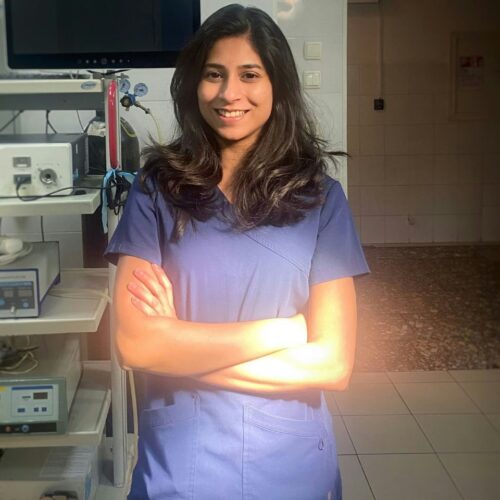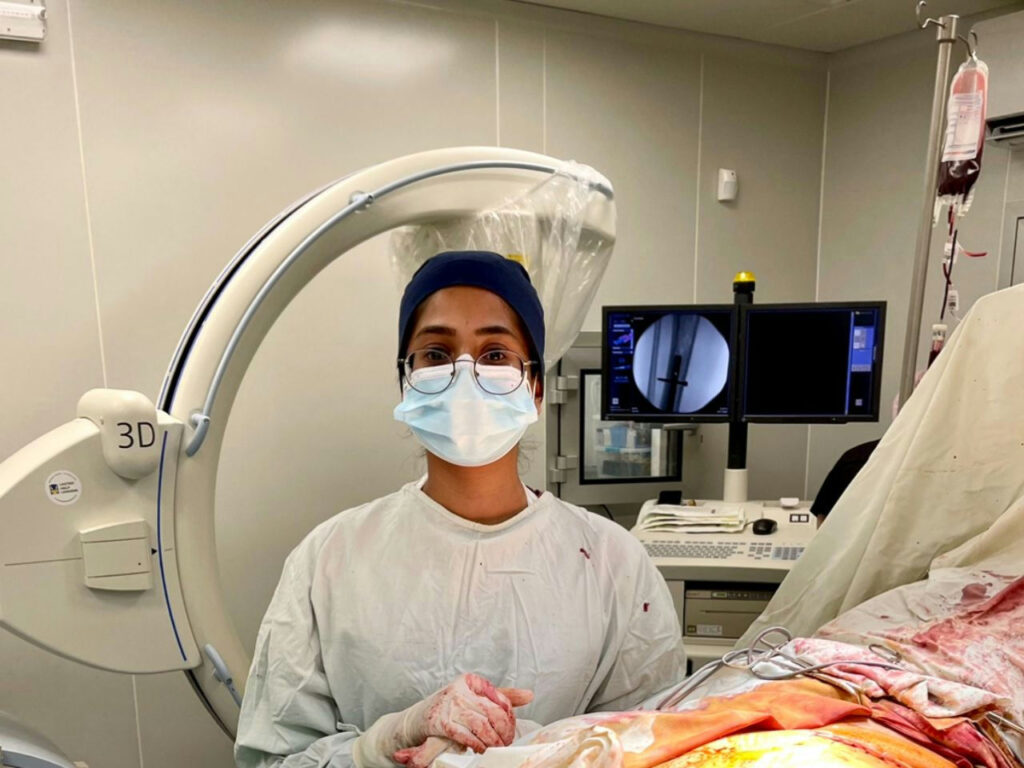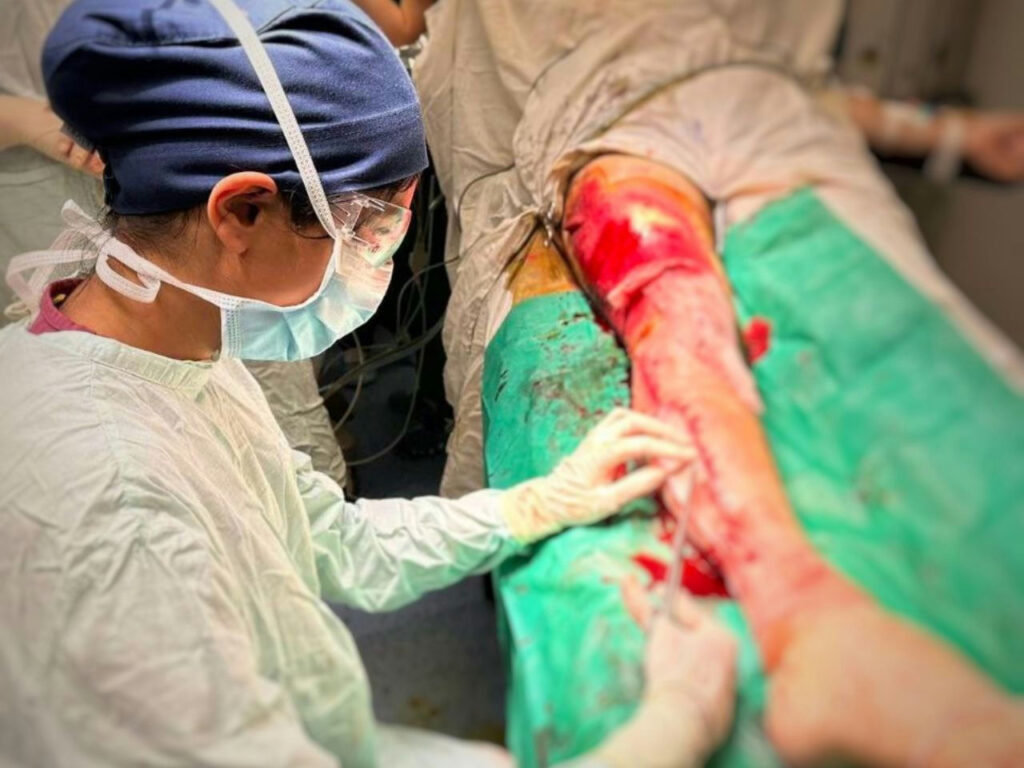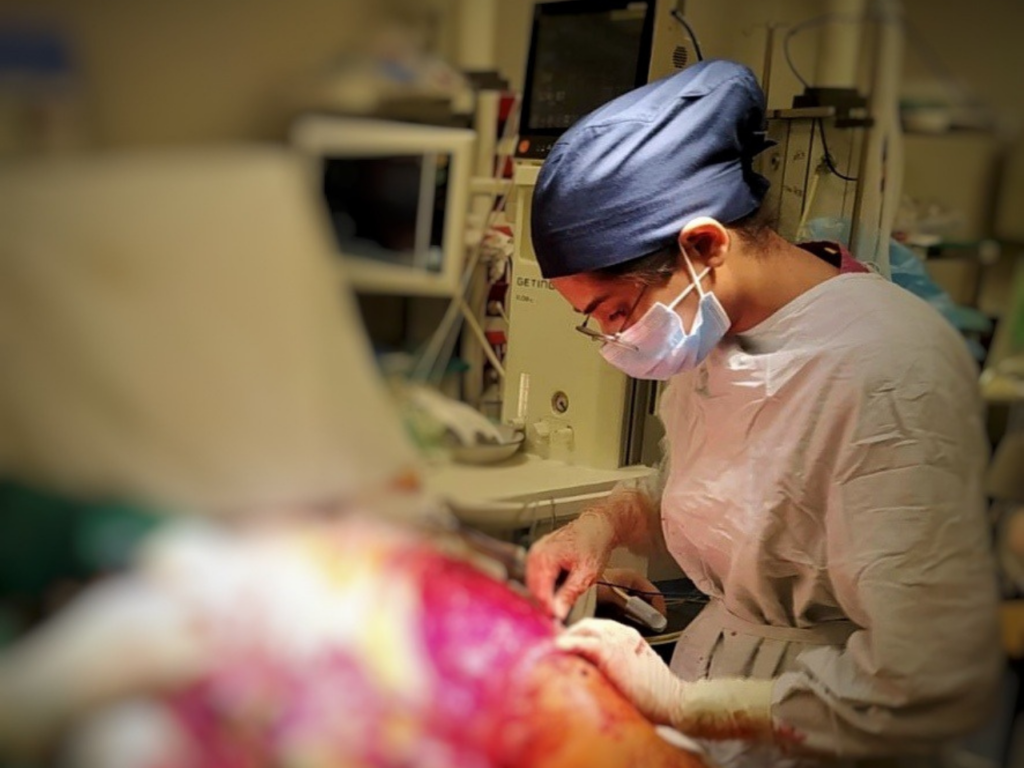In Ukraine, young medical student becomes wartime doctor: “As long as we keep healing and saving lives, hope remains.”
For every life we saved, we lost others. I still feel that burden. Yet, I realized something important. Despite the devastation and suffering, I needed to keep going. To stop or give up would simply allow the war to claim even more lives, stripping us of our humanity.
- 1 year ago
September 30, 2024

Kyiv, Ukraine ꟷ The exact moment the Russian invasion of Ukraine began remains marked in my memory. It changed my life completely. In early February 2022, I attended my medical internship at a hospital in Kyiv. In the third year of my program, I chased my childhood dream of becoming a doctor. Yet, nothing in my training prepared me for war, or for treating hundreds of patients with limited hands to help.
We all heard the warnings about rising tensions between Russia and Ukraine, but living through war proved more challenging than I ever imagined. All of my friends made it out and returned home, so I found myself alone. My parents urged me to flee, but I remained adamant. I would either survive or die doing what I dreamed of.
Read more stories out of Ukraine from Orato World Media.
Medical student trapped in Ukraine survives attacks, volunteers at Ukrainian hospital
A week before the Russian invasion began, foreign students began receiving advisories from their home countries urging them to leave Ukraine. India issued no such advisory until a day before. Everyone rushed around to escape as the cost of airplane tickets skyrocketed. Many made it out, but soon authorities shut down the airspace and hundreds of students became stranded at the airport.
Meanwhile, I continued to live in my flat alone, but I felt the love of support of the Ukrainians. They often stopped by to check on me and ask how I was doing. Every minute, it seemed, alarms rang signaling for us to run for shelter. The sound of bombs and missiles echoed constantly. I spent many nights in the early days sitting in the underground metro station with crowds of people.
Gradually, I gathered the courage to return to my flat. I slept on the floor close to the windows. When Russia launched missiles, the entire building shook and the windows near me cracked. Queues at the grocery stores began to grow long and food shortages ensued, as people hoarded food out of fear.
One day, while shopping at the grocery store, a missile attack struck just a few meters away, two buildings from my home. For at least a week, I survived eating bread alone. As the war reached a peak, the hospitals saw hundreds of patients a day. Limited staff and doctors caused challenges, so I offered to volunteer at one of the government hospitals. They promptly agreed. I began helping treat patients as the thundering booms of artillery echoed through the hospital windows.
Young medical intern in Ukraine starts out nursing patients and moves to surgeries
Terrified for my safety, my family begged me to return home and I had the chance to leave, but how could I? I needed to complete my training and my degree. I also refused to leave, seeing so many civilians and military personnel wounded. The patients needed me, and so did the hospital staff. With one doctor to 10 patients at that time, the idea of abandoning Ukraine felt more terrifying than staying.
The first few days of the invasion became pure chaos. Bombings flattened entire neighborhoods and hundreds of people flooded emergency rooms. Wounded civilians, soldiers, and children overwhelmed the facilities. I began by nursing people, applying basic dressings to wounds. Gradually, I started setting broken bones and giving people stiches. Within two months, I was performing surgeries on my own.

Staying at home alone scared me, so being in the hospital became my saving grace. In my flat, the littlest noises frightened me, and I grew tired of running to shelters. When air-raid sirens pierced through the night, we ran to the basement, but at the hospital, I could not pause in the middle of surgery. We often rushed to finish a surgery as electricity became limited. I remember sweating in fear in Ukraine’s chilling cold. We had no time to rest.
The doctors trusted my skills and I became a strong, supportive hand to them, especially as they treated severely wounded soldiers. Often, I stayed at the hospital for days at a time. While the hospital remained safe, many buildings around us became targets. One evening, while walking outside the hospital, a window exploded near me. The loud sound sent me instinctively to the ground as glass fell around me. A missile struck the neighboring building, leaving me scared as hell. I barely slept that night.
Young medical student haunted by the look in Ukrainian soldiers’ eyes
At least for a month, we faced a curfew. When they released the curfew for a few designated hours, we rushed to buy groceries. The hospital became the best place to stay in those days. The soldiers arrived in waves and treating them became one of the most harrowing experiences of my life. They showed such bravery, but they too felt pain. Often, their faces looked unrecognizable, covered in dust and blood.
Their bodies revealed gunshots and shrapnel wounds. Many lost limbs and others suffered from burns on large parts of their bodies. Yet, their injuries were not the worst part. I can never forget their eyes – that hollow, haunted look of people who saw too much death.
I remember one soldier – a young man barely older than me. An explosion left his right leg destroyed. We worked for hours to save him. In the end, we amputated the leg. When he awoke, he immediately asked about the other soldiers in his unit. I did not know what to say; many of them died. He never cried. Rather, he stared at the ceiling in complete silence.
Sleep soon became a luxury. We ate dry biscuits and canned food on the go, sneaking a few bites between surgeries. We experienced no respite and when I managed to close my eyes, nightmares of bombings and bleeding bodies woke me up shivering. I lost a lot of weight but kept it from parents. The stress proved too much, and the war has not stopped.
Future doctor counts the lives lost in Ukraine
The sound of distant bombings and the low rumble of tanks became part of my world. It never stopped – day or night. Still, I took solace in moments of humanity. My colleagues, who felt just as exhausted and terrified as me, cracked jokes and hugged one another. We became like family.
One night, a convoy of ambulances brought a group of severely injured soldiers. As the medics shouted, one of the soldiers grasped my hand. His face was almost unrecognizable from severe burns. He whispered something to me in this local language, but I did not understand. We worked for hours to stabilize him. When he died, we felt deeply troubled.

For every life we saved, we lost others. I still feel that burden. Yet, I realized something important. Despite the devastation and suffering, I needed to keep going. To stop or give up would simply allow the war to claim even more lives, stripping us of our humanity.
One night, a Minister of Foreign Affairs for Ukraine arrived. As the only doctor trainee there, I had to attend to him. I simply saw a patient who needed my attention. Bitten by a dog, I conducted the initial treatment. The minister asked who I was, and I told him. He seemed surprised I stayed in Ukraine, rather than fleeing home to India. A few hours passed, and my friends messaged me. The minister wrote about me on his social media account. His kindness meant so much, even though I felt I was just doing my duty.
From medical student to wartime doctor: young woman is forever changed
Two years passed and I remained in Ukraine, continuing my work as a medical intern. In time, I completed my degree and became a surgeon. Before I can become a full-time surgeon, I have some training left to complete. Working on my visa, I intend to go see my parents soon in my home in Pune, India.
With all routes through Russia closed, I will need to travel through Germany. While the travel process proves tedious, I need a break, and I want to see my family. They also deserve to take a breath. They too suffered in my absence but remain proud of me. Not only did I become a surgeon, but a wartime doctor.
I will never regret my decision to study in Ukraine. They offered a more affordable program than many European countries and courses in English. Ukraine gave me so much confidence and the chance to serve people in need.
I cannot say what will happen next. The war seems far from over. The road to recovery – for the country and for me – seems long and uncertain. I can say this experience changed me forever. Before the Russian invasion, I was a medical student, worried about exams and my career path. Throughout this experience, I became a person who saw the worst of humanity.
Yet, I also saw the incredible resilience of the human spirit, the will to survive, and the power of compassion in the darkest of times. To those still fighting and working in makeshift hospitals, I stand with you. In a broken world, as long as we keep healing and saving lives, hope remains.
































































































































































































































































































